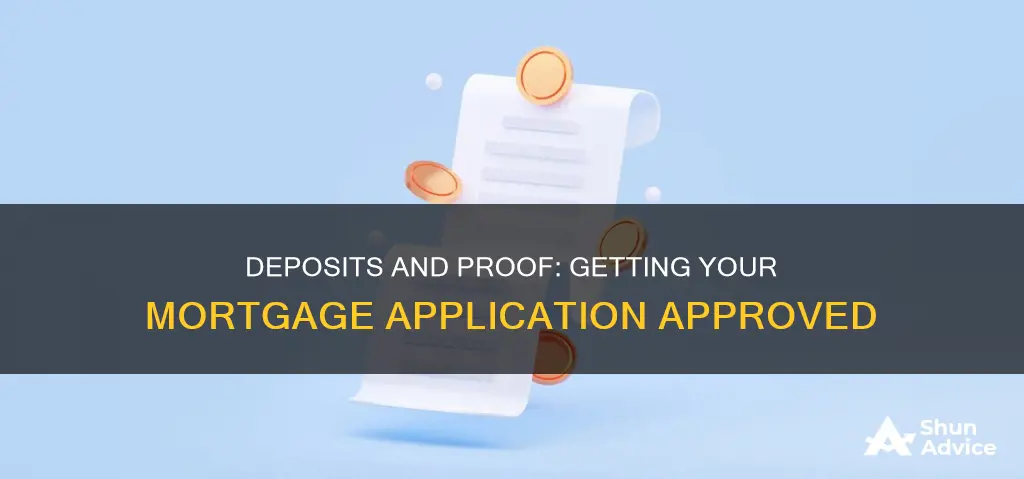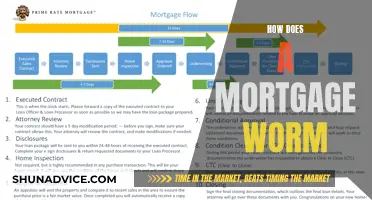
When applying for a mortgage, it is essential to provide proof of deposit. This is to ensure that the lender can verify the source of your funds and confirm that you can afford the repayments. The type of proof required will depend on the source of your deposit, and while some lenders may provide a mortgage offer without requiring proof of deposit, this is not a binding agreement. Commonly accepted forms of proof include bank statements, signed contractual agreements, and certain forms of certification. If you are unsure about what is required, it is recommended to consult a mortgage broker or adviser who can help you prepare the necessary paperwork and match you with a suitable lender.
| Characteristics | Values |
|---|---|
| Deposit sources | Personal savings/investments, gifts, inheritance, sale of property, sale of other assets, unsecured borrowing, deposit from overseas |
| Proof of funds | Bank statements, security or custody statements |
| Proof of deposit | Signed contractual agreements, bank/savings account statements, certain forms of certification, proof of savings, proof of sale, proof of gifted deposit |
| Non-standard deposits | Gambling winnings, compensation awards |
| Additional requirements for overseas deposits | Up-to-date statement showing available funds, annual ISA statement |
What You'll Learn

Proving the origin of your deposit
Personal Savings/Investments
Lenders are generally happy to accept deposits funded by the applicant's personal savings. They may require proof of the balance increasing over time, which can usually be demonstrated through account statements. If the savings are from an overseas account, you will need to provide documentation similar to that of a UK savings account, including up-to-date statements showing the available funds and regular payments from traceable sources.
Sale of Property or Other Assets
If you have received a lump sum from selling a property or other assets, you will need to provide evidence in the form of ownership documents, proof of sale, and bank account statements showing the proceeds from the sale. If the cash comes from selling a property, you should also provide a copy of the completion statement once the sale is finalized.
Inheritance
Lenders typically accept deposits funded by inheritance. You will need a signed document from the executor detailing the amount inherited, along with evidence of the funds in your bank account.
Gifted Deposit
For any form of gifted deposit, you will need a legal agreement confirming that the money is a gift that will never need to be repaid and that the donor has no rights over the property. The agreement should detail the value of the gift and be signed by all parties.
Gambling Winnings
Some lenders will allow gambling winnings to be used as a mortgage deposit, but regular gambling is known to cause issues when applying for a mortgage. You will need to provide a receipt confirming the winnings and the amount, along with a bank statement showing the incoming payment.
Equity Release from an Existing Property
If you are negotiating a larger mortgage with the same lender to cover multiple properties, you may not need to provide evidence of the deposit source, as they will already have full visibility of your situation. However, you will need to prove that you can afford the repayments for a larger mortgage.
It is important to note that each mortgage lender has their own specific criteria for acceptable sources of deposits. If you are unsure about how to prove your deposit source, consider speaking to a mortgage broker or adviser who can help you prepare the necessary paperwork and match you with a suitable lender.
Setting Up a Mortgage: Dependents and Their Homes
You may want to see also

Providing evidence for gifted deposits
The person gifting the deposit will need to provide proof of funds and identification. If the money comes from an expected source, such as the sale of a home, providing proof is straightforward. Bank statements may be required if the money has been saved over time to meet anti-money laundering checks. The donor will also need to provide photo identification, such as a passport, and two proofs of address.
A gifted deposit letter, also known as a gifted deposit declaration, is required by lenders to confirm that the money is a gift and that the donor has no rights over the property. This letter should include the donor's name and address, their relationship with the recipient, the total amount of the gift, its source, and confirmation that it does not need to be repaid. All parties involved should sign the letter.
It is important to note that not all lenders accept gifted deposits, and some may have their own stipulations. If the deposit is coming from outside the UK, additional documents may be required, such as up-to-date statements showing the available funds. Mortgage brokers can assist in determining the specific requirements and ensuring that all necessary documentation is provided.
Removing a Name from a Joint Mortgage: A Step-by-Step Guide
You may want to see also

Using gambling winnings as proof of deposit
When applying for a mortgage, it is essential to prove where your deposit came from. While gambling winnings can be used as a mortgage deposit, it is not a common practice. Lenders prefer to lend to customers who do not gamble regularly, and your choice of lenders will be limited. However, if you have a significant deposit, a clean credit history, and can prove the source of your winnings, your application is more likely to be successful.
If your winnings were in cash, you might struggle to prove their source, which could severely affect your chances of getting a mortgage. For the few solicitors who will accept cash, there is usually a limit to the amount they will accept, typically a few hundred pounds. Therefore, if you have a large sum of cash in your account that cannot be sourced, it is advisable to speak to a solicitor or mortgage broker for guidance.
To prove gambling winnings as your source of deposit, you will typically need to provide a receipt confirming your winnings and their amount. Additionally, you will need to show the money entering your bank account by providing a copy of your bank statement. This is necessary to prove the incoming payment from the gambling company.
It is worth noting that lenders will scrutinize large deposits or withdrawals in your bank account. They will also examine other factors, such as the property's loan-to-value (LTV) and your credit history. While a single large gambling win may not pose a problem, lenders are required to explore the origins of your deposit. Thus, it is crucial to provide proper documentation and work with a broker who can guide you through the process and match you with a suitable lender.
Reporting Mortgage Insurance Premiums: A Comprehensive Guide
You may want to see also

Deposits from the sale of property or assets
If you've sold a property or other assets to fund your mortgage deposit, you'll need to provide evidence in the form of ownership documents, proof of sale, and bank account statements. This is to ensure that the money has come from a legitimate source and to rule out any suspicions of fraudulent activity.
For property sales, you should also provide a copy of the completion statement once the sale has been finalized. This is in addition to the bank statements, which should show the proceeds from the sale. If you are selling other assets, such as a car, boat, or other legal sources, you will need to provide ownership documents and bank statements showing the money coming into your account from the buyer.
It is important to note that lenders will not accept large cash deposits without clear proof of where the money came from. They may require proof of the balance increasing over time, usually in the form of account statements.
If you are funding your deposit with an inheritance, you will need a signed document from the executor detailing the amount inherited, along with evidence of the money in your bank account.
If your deposit is a gift, you will need a legal agreement drawn up by a solicitor confirming that the money is a gift, will not be repaid, and that the donor has no rights over the property. This agreement must detail the value of the gift and be signed by all parties.
Closing Costs: Rolling Them into Your Mortgage
You may want to see also

Deposits from overseas
When it comes to deposits from overseas, there are a few key things to keep in mind. Firstly, you'll need to prove the source of the funds. This can be done by providing bank statements, transfer documents, or other evidence that shows where the money came from. It's important to provide documentation that proves the money has been in the account for a certain amount of time, as this can help lenders rule out any suspicions of fraudulent activity.
If the deposit is a gift, you'll need to provide additional documentation. This includes a letter confirming that the money is a gift and not a loan, and that the donor has no rights or interest in the property being purchased. It's also important to note that the donor will need to declare whether the money is a gift or a loan. If it's a loan, this must be disclosed to the mortgage lender, and a loan agreement should be drafted.
In addition to proving the source of funds, you'll also need to provide proof of identity and residence. This can include a valid passport, driver's license, or other forms of identification, as well as proof of address such as utility bills or rental agreements. Keep in mind that lenders will also assess your creditworthiness and ability to repay the loan, so be prepared to provide proof of income, employment history, and other financial information.
It's worth mentioning that there may be additional taxes or fees associated with receiving a deposit from overseas, so be sure to consult with a qualified tax professional to ensure full compliance. Working with an experienced conveyancing solicitor or a qualified overseas mortgage broker can be incredibly helpful in navigating these requirements and ensuring a smooth process. They can guide you through the specific criteria of different lenders and help you prepare the necessary documentation.
Setting Up a Mortgage in QuickBooks: A Step-by-Step Guide
You may want to see also
Frequently asked questions
A proof of deposit for a mortgage confirms that you have the funds available for a down payment. It also demonstrates the reliability of the borrower’s income and that the funds are from a legitimate source.
Common evidence includes signed contractual agreements, bank/savings account statements, and certain forms of certification. Other documents include ownership documents, proof of sale, and a formal legal agreement confirming that the money is a gift.
You can request a proof of deposit letter from your bank. It typically takes 24 to 48 hours for a bank to process this request. It is recommended to request the letter at least a week in advance.
If your deposit comes from an overseas account, you will need to provide additional documents. These may include up-to-date statements showing the available funds and the source of the money.
If you are unsure about how to provide sufficient evidence, consider speaking to a mortgage broker. They can help you prepare the necessary paperwork and match you with a suitable lender.







